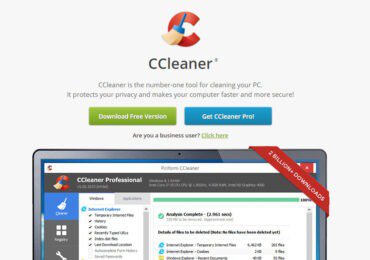
If we had focused on it during due diligence I’m sure we would have been able to find at least some indication.CCleaner malware infections continued for a month before the compromised binary was detected and the backdoor was removed.Īvast, which acquired Piriform over the summer, announced that between August 15 and September 15, a rogue version of the application was available on its server and was being downloaded by users. But I don’t see companies focusing too much on cybersecurity in terms of digging deeper into whether the company has a breach. "When companies do mergers and acquisitions, most of the due diligence is around financials, maybe legal risks, or intellectual property. "A big lesson for us was about due diligence," he says. Vlcek says that the most important thing Avast learned from the CCleaner infection is also an important takeaway for the industry at large. Avast also observed that ShadowPad, which in newer versions has that modular, customizable quality, was formerly all bundled into one program. The malware has evolved, and the CCleaner attackers used both older and newer versions as they infiltrated Piriform and the 40 chosen machines infected with the malicious CCleaner updates. ShadowPad has been used in targeted attacks since 2014, and evidence collected by both Avast and Kaspersky Lab in prior research indicates that its creators are Chinese-speaking. 'The investment these guys had to make to infiltrate 11 companies I don’t think was very high.' In this case, the attackers used the keylogger functionality and other analysis features to burrow deep into Piriform's development and distribution systems. The attackers installed malware called ShadowPad, sort of customizable malware platform that can be used for an assortment of attacks from DDoS to keylogging, on the compromised computers. From there, the attackers moved laterally to a second computer, always working outside office hours when it was unlikely that people would be using the machines. Hackers initially got onto Piriform’s London networks by using stolen credentials to log into a TeamViewer remote desktop account on a developer PC. "As a threat research organization we do analysis like this on a daily basis, it's right in our core competency, so it was sort of ironic to suddenly be in the business of forensically analyzing our own attack." It was an unexpected surprise gift we got as part of the acquisition," Vlcek told WIRED ahead of his talk at RSA. "This thing was a bit, shall we say, black. But the specter of supply chain attacks is difficult to shake. Vlcek says that Avast's quick response and existing goodwill toward CCleaner-which has a sometimes cultish online following-has allowed Avast to learn from the incident and better protect its users. By September, it knew it had a massive security crisis on its hands. On March 11 of last year, attackers compromised the systems Piriform, the company that created CCleaner.



Avast ccleaner malware name software#
The incident exposed millions of computers and reinforced the threat of so-called digital supply chain attacks, situations where trusted, widely distributed software is actually infected by malicious code.Īt the RSA security conference in San Francisco on Tuesday, Avast executive vice president and chief technology officer Ondrej Vlcek walked through a post-mortem of the attack, which ultimately led to 2.27 million downloads of the corrupt CCleaner version. The software updates users were downloading from CCleaner owner Avast-a security company itself-had been tainted with a malware backdoor. In September, security researchers at Cisco Talos and Morphisec made a worst nightmare-type disclosure: the ubiquitous computer cleanup tool CCleaner had been compromised by hackers for more than a month.


 0 kommentar(er)
0 kommentar(er)
